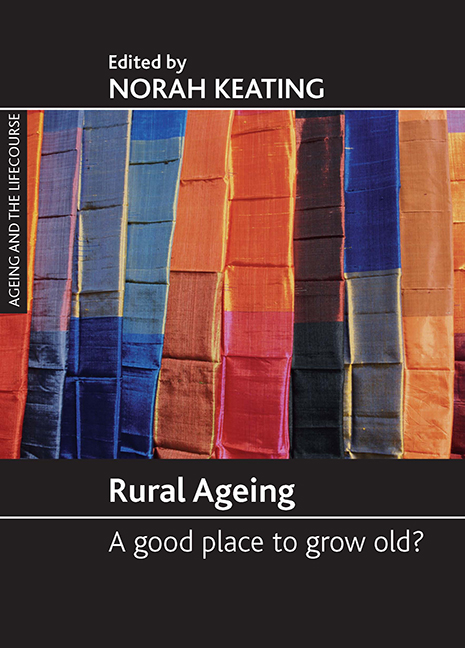Book contents
- Frontmatter
- Contents
- Foreword
- Acknowledgements
- Notes on contributors
- one A critical human ecology perspective on rural ageing
- two Crossing borders: lifecourse, rural ageing and disability
- three Rurality and ageing well: ‘a long time here’
- four The evolution of networks of rural older adults
- five Distance, privacy and independence: rural homecare
- six Respite for rural and remote caregivers
- seven Ageing, disability and participation
- eight Participation in rural contexts: community matters
- nine Staying connected: issues of mobility of older rural adults
- ten Ageing and social exclusion in rural communities
- eleven Age-friendly rural communities
- twelve Revisiting rural ageing
- References
- Index
- Other titles in the Ageing and the Lifecourse series
five - Distance, privacy and independence: rural homecare
Published online by Cambridge University Press: 19 January 2022
- Frontmatter
- Contents
- Foreword
- Acknowledgements
- Notes on contributors
- one A critical human ecology perspective on rural ageing
- two Crossing borders: lifecourse, rural ageing and disability
- three Rurality and ageing well: ‘a long time here’
- four The evolution of networks of rural older adults
- five Distance, privacy and independence: rural homecare
- six Respite for rural and remote caregivers
- seven Ageing, disability and participation
- eight Participation in rural contexts: community matters
- nine Staying connected: issues of mobility of older rural adults
- ten Ageing and social exclusion in rural communities
- eleven Age-friendly rural communities
- twelve Revisiting rural ageing
- References
- Index
- Other titles in the Ageing and the Lifecourse series
Summary
‘Oh, the other thing that's fabulous here, which I didn't even mention, I think, is this homecare thing. Has anybody talked to you about that? They have this through the [agency name], and you can stay in your own home until you’re practically at death's door because they’ll come and get you up in the morning. They get your breakfast. Somebody comes to get your lunch. Somebody comes and gets your supper. Somebody comes to put you to bed. It's wonderful. Of course, you know them all, you know, because they were friends and neighbours. They’re your friends’ kids or something, you know, and it's a wonderful thing.’ (Older woman in rural Canada, receiving home support)
Introduction
For many older people, ageing in place is enabled by a frequently complex system of support comprised of relatives, paid or formal caregivers, neighbours and friends (Sims-Gould and Martin-Matthews, 2007). The receipt of adequate and appropriate homecare is one component of the formal service sector that contributes to the likelihood of older rural residents remaining in their homes and communities.
Homecare is an expanding sector of healthcare delivery in many countries around the world (Hall and Coyte, 2001; McClimont and Grove, 2004; Broese van Groenou et al, 2006). Overall population ageing, combined with a strong desire to ‘age in place’, creates an increased likelihood that many older people will use homecare. The increased likelihood for use of homecare also exists within many rural and remote areas around the world, particularly in the absence of local hospitals or other acute/post-acute care options. This chapter examines the experiences of home support workers and older clients in the delivery and receipt of home support services in rural Canada.
The receipt of appropriate home support services enables many older people to remain in their homes and communities as they grow older. In rural areas, home support services are particularly important in that they can often prevent or delay the relocation of an older person to an urban centre where hospitals, acute and post-acute care are more readily available. While there is a growing body of knowledge on homecare, few studies have examined home support in the rural context (Williams and Cutchin, 2002; Canadian Homecare Association, 2006).
- Type
- Chapter
- Information
- Rural AgeingA Good Place to Grow Old?, pp. 43 - 52Publisher: Bristol University PressPrint publication year: 2008



